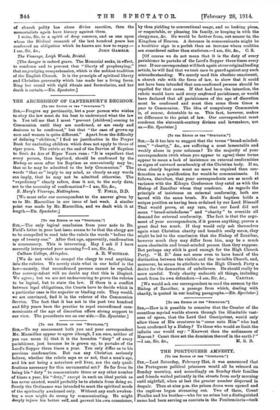DENIAL OF ARTICLES OF FAITH.
(To me Emma or Tax flan:on:ma-) Sin.,—The Memorial on the above subject recently presented to Convocation is of grave moment to every member of the English Church. The wish of the memorialists is to commit the Church to a repudiation of all scientific or historical con- clusions which are or seem inconsistent with the letter of her Creeds or with her existing church polity. It is impossible to exaggerate the gravity of such a demand. That this, however, is the real issue will appear plainly if the two requests made to the Bishops are examined.
(1) They are asked " to repudiate the claims of some clergy to reject the miracles of our Lord's birth of a Virgin, and the actual resurrection of His body from the tomb." Now, if this means that the clergy should be forbidden to put forward in their pastoral teaching any theory of their own, be it what it may, regarding the physical processes to which these articles of the Creed point, we should all, I believe, acquiesce in the wisdom of such prohibition. No man can claim for any theory of the kind he may advance anything more than the authority of an individual conjecture. Indeed, to a reverent mind, speculation on such subjects is in the highest degree distasteful. It convinces and edifies no one. Plainly, the request of the memorialists must mean more that this, It must mean that the clergy, when they study the Book whose interpretation they have promised to make the chief business of their lives, shall deliberately close their minds against the sacred critical learning which has now been accumulating for more than a century. If they deal at all with this learning they find themselves at once confronted by questions arising out of the history and the interprets. lion of the Creeds. The memorialists apparently regard the articles of the Apostles' Creed as susceptible of no more than one interpretation. I well remember, however, a public utterance of Archbishop Temple, then Bishop of London, in which he urged his clergy to lose no opportunity of informing their listeners that the Church did not teach a resurrection of the material flesh, although the article of the Creed seemed to bind her to such teaching. Can we affirm in the face of such a fact as this that any article of the Creed is beyond the reach of reinterpretation ? In any case, to place the Church in an attitude of prejudged antagonism to the conclusions, or even the hypotheses, of historical science would be to inflict upon her a mortal wound, and would certainly deprive her of the services of many loyal clergy.
(2) The second request of the memorialists is more ambiguous. They wish it to be made plain that, "in accord- ance with the teaching of the Church in all ages, the Church of England has always taught and must continue to teach the necessity of episcopal ordination as a condition of exercising the ministry of the Word and Sacraments." If this means that the government of the primitive Church was what is known as a "monarchical episcopate," or that our own form of church polity has alone divine sanction, then the memorialists again have history against them.
I write, Sir, in a spirit of deep concern, and as one upon whom the Biblical research of the last hundred years has conferred an obligation which he knows not how to repay.— I am, Sir, Ala, Joan GAMBLE. The Vicarage, Leigh Woods, Bristol.
[The danger is indeed grave. The Memorial seeks, in effect, to condemn and to prevent that "liberty of prophesying," that ungrudging comprehension, which is the noblest tradition of the English Church. It is the principle of spiritual liberty and Christian generosity which hits made her a living force. Ring her round with rigid rituals and formularies, and her death is certain.—En. Spectator.]















































 Previous page
Previous page